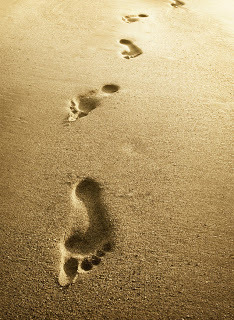Tips for Writers: Walk This Way
 My tip today is closely related to theprevious one. (See The Thesaurus Throwdown.)
My tip today is closely related to theprevious one. (See The Thesaurus Throwdown.)This week I was teaching an adulteducation class in writing fiction. The group has been enthusiastic and fun,and they seem to appreciate the tips that I've been able to share with them.Each week we read a couple of stories by well-known writers that illustratesome aspect of the craft and we discuss them. On the subject of handling Time,I assigned Tim O'Brien's amazing story "The Things They Carried" from hisamazing book of the same name. The way backstory is delivered in the story isquite amazing. (Subtip: don't overuse words like "amazing.")
But that's not what I'm writing abouthere. Early in the story, the narrator says this:
"To carry something was to hump it, aswhen Lieutenant Jimmy Cross humped his love for Martha up the hills and throughthe swamps. In its intransitive form, to hump meant to walk, or to march, butit implied burdens far beyond the intransitive."I love this narrative intrusion intothe story to comment on the choice of the word "hump," which is exactly theright word for the action described because of the extra weight that the worditself carries. When choosing the right word—a verb, or a noun—thoseimplications are critical, and this alternative to the verb "to walk" is agreat illustration. Whenever I see "walk" in a student's story, I circle itbecause there is almost always a more evocative alternative. Not a synonym, buta word that is more precise or one that has a connotation that will providemore depth to the sentence in which the word is used. "To hump" implies burdensfar beyond the intransitive. But what does "walk" really mean. Can we visualize"to walk"? Does it suggest anything about mood?
Maybe, but there are so many other ways that one can render motion from one point to another that I have to believe there will always be a better choice: step, tread, pace, stride, stride out, move fast, strut, stalk, prance, mince, be proud, tread lightly, tiptoe, trip, skip, dance, curvet, leap, tread heavily, lumber, clump, stamp, tramp, goosestep, toddle, patter, pad, totter, stagger, lurch, reel, stumble, oscillate, limp, hobble, waddle, shuffle, shamble, dawdle, move slowly, paddle, wade, go on foot, ride shanks' mare, foot it, hoof it, hike, footslog, wear out shoe leather, plod, stump, trudge, jog, go, go for a walk, ambulate, perambulate, circumambulate, pace up and down, go for a run or a jog, take the air, take one's constitutional, march, quick march, slow march, troop, file, file past, defile, march in procession, come after, walk behind, follow, walk in front, precede.
(All of these are from a thesaurus, and note that the word "hump" isn't included, and yet that was exactly the right word for O'Brien.)
Published on October 07, 2011 05:16
No comments have been added yet.



